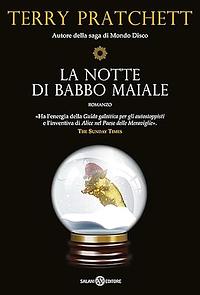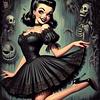Take a photo of a barcode or cover
adventurous
funny
medium-paced
adventurous
emotional
hopeful
medium-paced
Plot or Character Driven:
A mix
Strong character development:
Yes
Loveable characters:
Yes
Diverse cast of characters:
Yes
Flaws of characters a main focus:
No
adventurous
funny
lighthearted
medium-paced
Plot or Character Driven:
A mix
Strong character development:
Yes
Loveable characters:
Yes
Diverse cast of characters:
No
Flaws of characters a main focus:
Complicated
HO HO HO! It was Hogwatch season and it was time to read Hogfather. As an X-Mas adjacent book, it is a pretty good one, there are lots of great spoofs and jabs at the holiday in a very Terry Pratchett-esque way. As my third Pratchett book and second Discworld book, I came away a bit disenchanted with his style and structure. Without chapters, everything just feels very fluid and hard to grasp in terms of setting a scene or timeline, to steal from Pratchett: it all feels very "timey-wimey". I could never quite be sure who was where or with whom and it all distracts from something that, at its core, is very fun if not a bit goofy. It feels a bit like the book is meant to be a stage play where some of the interstitials between scenes would make the context more forthright. I am a visual reader who needs to be able to clearly have a good sense of space, time, and setting in a scene. Without that, I start doubling back and that can become quite tedious.
Anyways, Death remains a great character in Discworld and I actually enjoy the odd mythos of the world and its inhabitants, so my structural complaints annoy me because I do want to read more but don't know if I would make it much further.
Anyways, Death remains a great character in Discworld and I actually enjoy the odd mythos of the world and its inhabitants, so my structural complaints annoy me because I do want to read more but don't know if I would make it much further.
funny
lighthearted
medium-paced
Plot or Character Driven:
Character
Strong character development:
No
Loveable characters:
Yes
Diverse cast of characters:
Yes
Flaws of characters a main focus:
No
funny
hopeful
lighthearted
medium-paced
Plot or Character Driven:
A mix
Strong character development:
Complicated
Loveable characters:
Yes
Diverse cast of characters:
No
Flaws of characters a main focus:
No
adventurous
funny
mysterious
reflective
medium-paced
Plot or Character Driven:
A mix
Strong character development:
Yes
Loveable characters:
Yes
Diverse cast of characters:
Yes
Flaws of characters a main focus:
N/A
adventurous
funny
lighthearted
mysterious
medium-paced
As is always with Discworld, I loved a lot of this, but I do still have my problems with it. Namely, I did not enjoy the band of criminals hired to take out the Hogfather. In regards to Mr. Teatime (pronounced Te-ah-tim-eh), I never enjoy when an entire character is just "he's ~crazy~" and it's made worse by how up its own ass this book is about the fact that the other criminals have faced down all sorts of terrifying things, but never anything as scary as him. Also the running joke about everyone mispronouncing his name because it sounds funny in English felt racialized. Race in this case referring to ethnicity rather than skin color because I don't recall any references to non white features, so probably written as a joke about Welsh, Scots, or Irish people. Banjo also rubbed me the wrong way. I'm always very cautious about the Lennie archetype because it often feels mean spirited towards intellectually disabled people, and the fact that Banjo's two character traits were "clearly intellectually disabled" and "he's so fat he's like a mountain," I do think that's the case here. At least Susan stood up for him a little bit.
In regards to the other tertiary characters, I didn't care for the God of Hangovers. He's not offensive or anything, I just didn't give a shit about him and was mildly annoyed at the romance he was given. Pratchett's good at romances once the couple is together, but getting them together often feels like "he was a boy, she was a girl, can I make it anymore obvious?" And admittedly, you can blame this case on how small of characters they both are, but it's nonetheless a recurrent pattern. I know he's just here to give Susan someone to talk to, but I would have much preferred she just hang out with the Death of Rats and the raven again. On the bright side, this was the most I've liked Ridcully and the other senior wizards so far- with the exception of the Senior Wrangler trying to get a fairy wasted so he could sleep with her. I know the 90s likely had different cultural lines as to what was generally regarded as sexual assault, but I sure didn't like it anyway. Overall, I still would have preferred if the witches had been investigating the sudden incarnation of forces, but with that one exception, the wizards were still fun and I do understand on a narrative level why they were chosen instead of the witches.
Onto the things I liked. First of all, "Death becomes Santa Claus"? 10/10 concept. I personally would have enjoyed it more if Pratchett had stuck to his initial lore that the Hogfather stocks pantries full of meat rather than giving kids presents- first of all, just a funnier thing to do, second, it would have felt much less Christianity-Lite. But given how the overall themes of the book developed, I do understand why the Hogfather was made more of a 1:1 with Santa Claus.
I was reading the book and thought to myself, "It's fun and the concept is great, but it's kind of an average Discworld book; I don't see why this one is so beloved." And then I got to Susan and Death's conversation after saving the Hogfather, and I immediately got it. The idea of comparing fables like Santa Claus to values like justice and mercy feels ridiculous on its head, just like how Susan reacts to it, but. There's a thing called the Scissor Man in this book that apparently British people tell their children about, and when I first read about him, I was like "That can't be an actual thing people tell their kids, that has to be exclusive to Discworld. But Santa, the Tooth Fairy, and the Easter Bunny are all real, so why would this guy be fake?" and then I realized that I had just referred to Santa, the Tooth Fairy, and the Easter Bunny as "real." And I had to sit there like, well, they are real, in a sense. There may not in any tangible way be a fat man who delivers presents to every kid in the world on Christmas, but because we have stories about him and keep telling those stories and new ones to keep him in the cultural consciousness, he is- in a way- extant. Which made the idea that there's nothing physical about justice or mercy or duty but that we have nonetheless created them and made them real things in our world resonate all the more. It was a fascinating way to examine the beauty of humanity that we have made those things and continually choose to keep them existing.
That shit right there is why I love Discworld. That, and that the Death of Rats is also called the Grim Squeaker- that's also why I love Discworld. It is often so very flawed, but it provides a unique lense through which to examine the world in all its nastiness and, crucially, in all its beauty. And its so funny while doing it. 4.5⭐️
In regards to the other tertiary characters, I didn't care for the God of Hangovers. He's not offensive or anything, I just didn't give a shit about him and was mildly annoyed at the romance he was given. Pratchett's good at romances once the couple is together, but getting them together often feels like "he was a boy, she was a girl, can I make it anymore obvious?" And admittedly, you can blame this case on how small of characters they both are, but it's nonetheless a recurrent pattern. I know he's just here to give Susan someone to talk to, but I would have much preferred she just hang out with the Death of Rats and the raven again. On the bright side, this was the most I've liked Ridcully and the other senior wizards so far- with the exception of the Senior Wrangler trying to get a fairy wasted so he could sleep with her. I know the 90s likely had different cultural lines as to what was generally regarded as sexual assault, but I sure didn't like it anyway. Overall, I still would have preferred if the witches had been investigating the sudden incarnation of forces, but with that one exception, the wizards were still fun and I do understand on a narrative level why they were chosen instead of the witches.
Onto the things I liked. First of all, "Death becomes Santa Claus"? 10/10 concept. I personally would have enjoyed it more if Pratchett had stuck to his initial lore that the Hogfather stocks pantries full of meat rather than giving kids presents- first of all, just a funnier thing to do, second, it would have felt much less Christianity-Lite. But given how the overall themes of the book developed, I do understand why the Hogfather was made more of a 1:1 with Santa Claus.
I was reading the book and thought to myself, "It's fun and the concept is great, but it's kind of an average Discworld book; I don't see why this one is so beloved." And then I got to Susan and Death's conversation after saving the Hogfather, and I immediately got it. The idea of comparing fables like Santa Claus to values like justice and mercy feels ridiculous on its head, just like how Susan reacts to it, but. There's a thing called the Scissor Man in this book that apparently British people tell their children about, and when I first read about him, I was like "That can't be an actual thing people tell their kids, that has to be exclusive to Discworld. But Santa, the Tooth Fairy, and the Easter Bunny are all real, so why would this guy be fake?" and then I realized that I had just referred to Santa, the Tooth Fairy, and the Easter Bunny as "real." And I had to sit there like, well, they are real, in a sense. There may not in any tangible way be a fat man who delivers presents to every kid in the world on Christmas, but because we have stories about him and keep telling those stories and new ones to keep him in the cultural consciousness, he is- in a way- extant. Which made the idea that there's nothing physical about justice or mercy or duty but that we have nonetheless created them and made them real things in our world resonate all the more. It was a fascinating way to examine the beauty of humanity that we have made those things and continually choose to keep them existing.
That shit right there is why I love Discworld. That, and that the Death of Rats is also called the Grim Squeaker- that's also why I love Discworld. It is often so very flawed, but it provides a unique lense through which to examine the world in all its nastiness and, crucially, in all its beauty. And its so funny while doing it. 4.5⭐️



